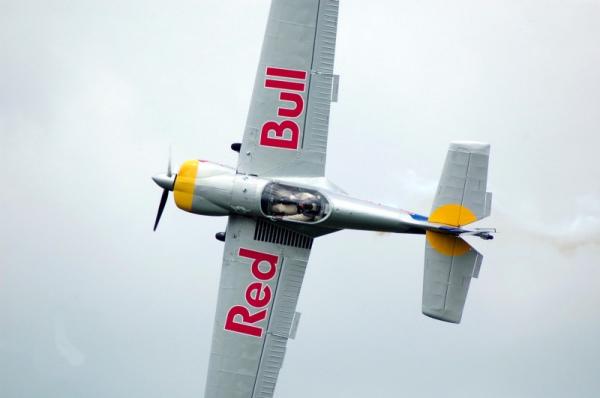
There’s a new scary poison in town. It comes wrapped in a thin, shiny can, and tastes like someone mixed cough syrup and Coke and then poured it over a few kilos of sugar.
I’m talking, of course, about energy drinks.
Recently, energy drinks have again been in the news as probably the worst thing that you could do to your body, causing everything from nausea to seizures. They are apparently going to destroy our youth and kill us all.
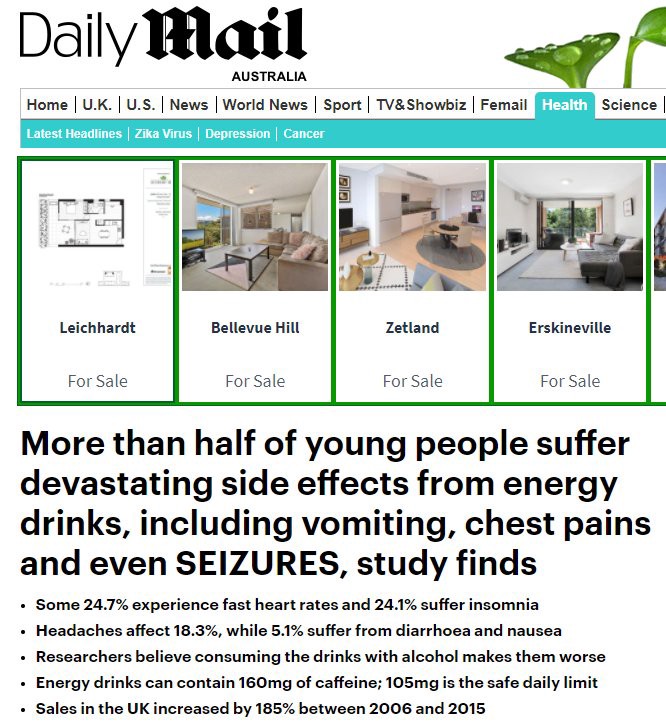
Sometimes I love the Daily Mail. If they learned how to science, where would I go for comedic material?
Sounds scary, right?
Wrong.
Drinking Energy
Energy drinks are the newest addition to our cultural grab-bag of Sugary Drinks That Are Bad For Us. They joined sports drinks, which are basically colored sugar with a bit of water added to it, and soft drinks, which are the same except in cans, to make a wonderful triumvirate of poor health choices that you can get at the corner store.
Small wonder that obesity rates are rising, really.
But there’s something special about energy drinks. From the Red Bull slogan that it “gives you wings” to the cool, futuristic branding on V, there’s a mystique about energy drinks that sets them apart. They aren’t just flavored sugar-water; they’re something special. And not just the caffeine.
They’ve got science behind them.
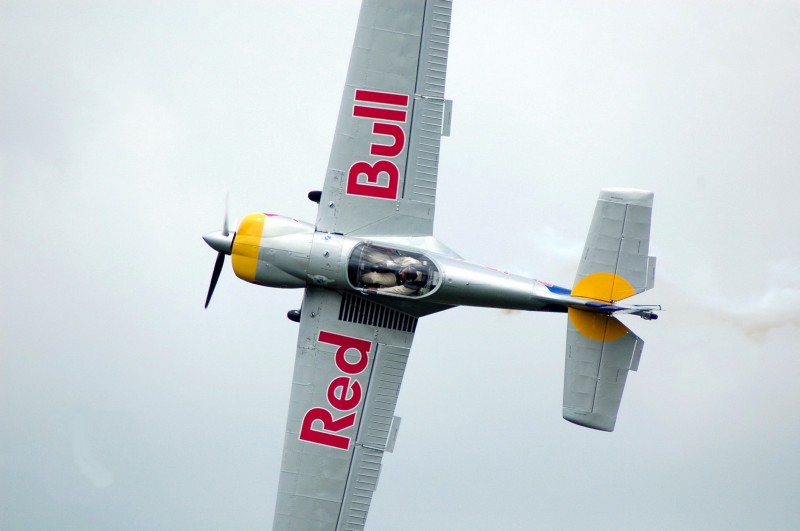
Science, pilots, basically the same thing right?
But the problem with these cool, slightly mythologized scientific elements is that no one actually knows what they do. You see the slogan — “Added Guarana, Tuarine and Ginseng For Power!” — but aside from caffeine, which we all know makes coffee an addictive wonder, it’s basically just buzzwords for most of us.
And sadly, people fear what they don’t understand.
Scientific Surveys
The recent media hubbub has centred around a recent study done in Canada that looked at young people — aged 12–24 — who drink coffee and energy drinks. They asked respondents a number of questions about adverse events like headaches, nausea and seizures, and then compared the rate of these things between the people who drank energy drinks and those who drank coffee.
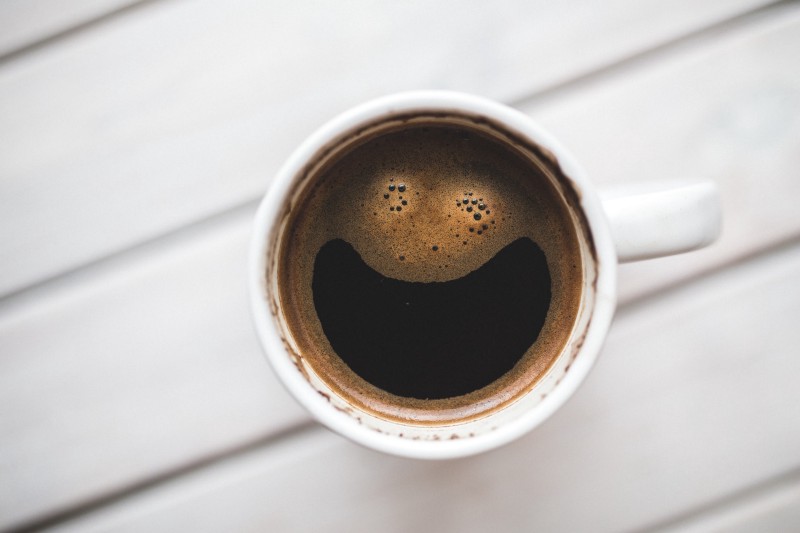
Pictured: Happy Coffee. No, seriously, that is the name of this stock photo it’s wonderful
The scientists found that young people reported a variety of negative symptoms after drinking energy drinks as well as coffee, but that the rate at which these occurred was slightly higher in the energy drink group than the coffee one. This difference was statistically significant, meaning that the results were impressive enough to be published in an academic journal and covered in every news outlet across the globe.

Pictured: Fear
There’s a few minor issues that most people didn’t pick up on. The “over half of all young people suffer side-effects” figure that many stories quoted is actually much less scary when you consider that of those who drank coffee, the rate was nearly 40%. Also, despite all the reports of seizures — because seizures are scary and nothing sells stories like fear — the actual reported rate of seizures was 0.2% and didn’t differ between the coffee and energy drink groups.
This study is also heavily subject to something called recall bias. This is basically a scienc-y way of saying “people are terrible at remembering things”. What this means is that asking people what happened that time they drank energy drinks might give you a meaningful answer, or it might give you total rubbish. It’s often hard to extrapolate the results of surveys like this one to the real world, because without a solid biological measurement of some kind it’s possible that the entire thing is just an artifact of people thinking that energy drinks are nasty and that biasing their answers.
But despite that, the researchers did still find that energy drinks were associated with more side-effects.
So why aren’t I worried?
Boozing It Up
The big thing that everyone completely missed is nicely laid out in a table hidden in the results section of the study:
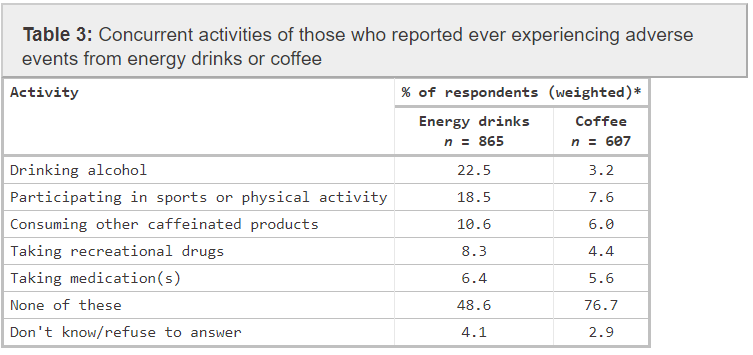
Pictured: Sneaky
This is a table of what the young people surveyed said they were doing when they drank the energy drinks or coffee. This is important, because if they were, say, jet-skiing, then you might expect that they would experience different rates of skiing-induced adverse events.
Now, look at the top line again:

What this is showing is that people were about 20% more likely to be drinking alcohol when they drank energy drinks than when they imbibed coffee. Alcohol, which causes nasty side-effects like nausea, headaches, and yes, even seizures. It’s entirely possible that the entire result that the researchers identified is just down to the fact that these young people were more likely to be drinking alcohol with energy drinks than coffee, causing the side-effects that have been splashed all over the news.
To put it another way, this study doesn’t tell you anything whatsoever about the dangers of energy drinks.
Nothing.
Zip.
It’s good as a starting point, but you’d need a lot more evidence before making any conclusion. It could be alcohol, it could be something else entirely linked to booze and energy drinks — parties, for example, can involve both booze, energy drinks and other things that are bad for your health like recreational drugs. From these results, we just don’t know.
Sadly, “We Aren’t Sure” doesn’t make as good a headline as “Energy Drink Danger”.
And anyone who had read the study would know this. Instead, there are scare stories all over the internet talking about the evils of energy drinks without noting that this study doesn’t really show that at all.
Bottom Line?
Firstly, I’ll say this: no one should drink energy drinks. They are basically soft drinks except with added caffeine and various nonsense supplements — the taurine, guarana, bitter orange and vitamins are basically just a marketing tool — and so are just as unhealthy and bad for you. This goes doubly for young children, who shouldn’t really be having caffeine or 10 teaspoons of sugar per serving anyway.
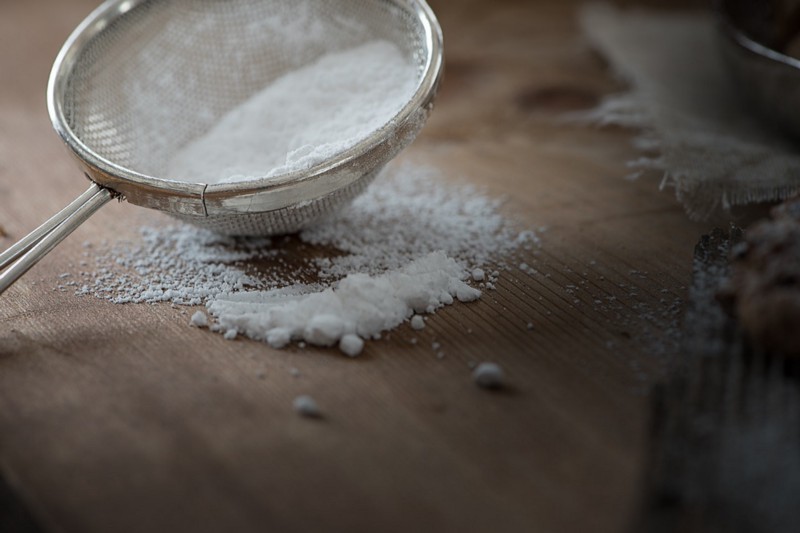
Pictured: Soft drinks, basically
As well as that, they can be pretty dangerous for really young kids, with the high levels of caffeine being a potential risk. They’re also really expensive, and you can get virtually all of the benefits aside from feeling like a teenager again from a strong coffee with several sugars for half the price.
So my advice is to not drink energy drinks if you can avoid it. They are a total waste of calories, and to make matters worse taste like slightly off cough syrup that’s just been thrown up by a three-year-old.
Energy drinks aren’t great.
They just aren’t poison.
No matter what anyone tries to tell you.
Gideon Meyerowitz-Katz also writes on Medium, where this was first published. You can read the original here.



